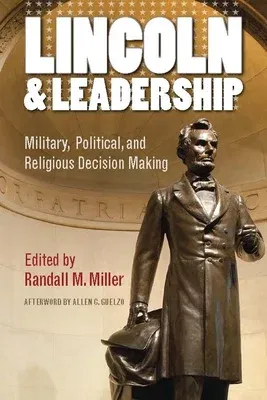A book that does something truly remarkable: says something new about
Lincoln!
Lincoln and Leadership offers fresh perspectives on the 16th
president-making novel contributions to the scholarship of one of the
more studied figures of American history. The book explores Lincoln's
leadership through essays focused, respectively, on Lincoln as
commander-in-chief, deft political operator, and powerful theologian.
Taken together, the essays suggest the interplay of military, political,
and religious factors informing Lincoln's thought and action and guiding
the dynamics of his leadership. The contributors, all respected scholars
of the Civil War era, focus on several critical moments in Lincoln's
presidency to understand the ways Lincoln understood and dealt with such
issues and concerns as emancipation, military strategy, relations with
his generals, the use of black troops, party politics and his own
re-election, the morality of the war, the place of America in God's
design, and the meaning and obligations of sustaining the Union.
Overall, they argue that Lincoln was simultaneously consistent regarding
his commitments to freedom, democratic government, and Union but
flexible, and sometimes contradictory, in the means to preserve and
extend them. They further point to the ways that Lincoln's decision
making defined the presidency and recast understandings of American
"exceptionalism." They emphasize that the "real" Lincoln was an
unabashed party man and shrewd politician, a self-taught
commander-in-chief, and a deeply religious man who was self-confident in
his ability to judge men and to persuade them with words but unsure of
what God demanded from America for its collective sins of slavery.
Randall Miller's Introduction in particular provides essential weight to
the notion that Lincoln's presidential leadership must be seen as a
series of interlocking stories. In the end, the contributors
collectively remind readers that the Lincoln enshrined as the "Great
Emancipator" and "savior of the Union" was in life and
practice a work-in-progress. And they insist that "getting right with
Lincoln" requires seeing the intersections of his-and
America's-military, political, and religious interests and identities.

